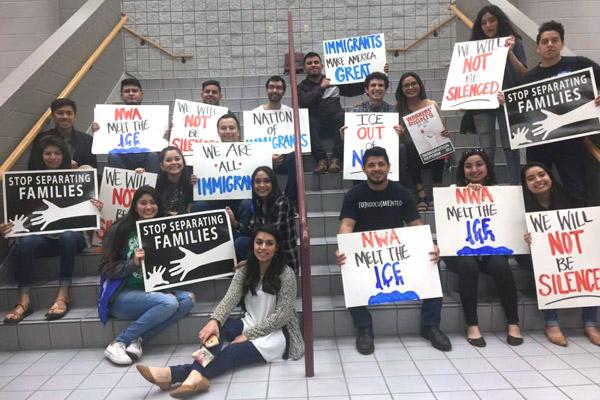
In 2012, President Barack Obama signed the Deferred Action for Childhood Arrivals Program (DACA) executive order that allowed certain protections for undocumented immigrants who came to the U.S. when they were younger than 16 and were 31 years old or younger as of June 15, 2012.
Humberto Marquez, 22, who came to the United States when he was about 6 years old from Jalisco, Mexico, grew up in Waldron, attending St. Jude Thaddeus Church. Marquez credits his work in youth ministry as his “first taste of community organizing.” After graduating from the University of Arkansas at Fort Smith with a bachelor’s in business administration and international business, he was hired as the west Arkansas organizer for the Arkansas United Community Coalition, where the mission is to “empower Arkansas immigrants and their communities through organizing, coalition building and the promotion of civic engagement.”
“As an immigrant myself I feel very proud but at the same time I’m very determined and very aware of what can happen if anti-immigrant policies were to pass,” he said of his social justice work. He said the Trump administration is being “very strategic” on how they are approaching DACA.
Though repealing it was a promise Trump made on the campaign trail, Marquez said there would be “an immense turnout in the streets not only from DACA recipients, but business leaders because we have a lot of DACA working in white or blue collar jobs.”
“I’m grateful for DACA, but at the same time I don’t feel liberated because my family is still living in the shadows,” Marquez said. “This is the reality that many families face nationwide.”
While the DACA program is positive for many child immigrants, it still leaves many with a sense of separation in society. Sofia, a 22-year-old Little Rock resident, who asked that her real name not be used, said she is grateful for DACA and the benefits, but said the label is tough.
“You grow up your whole life here, learn the language, live the culture and this is the home you know only to realize this home doesn’t classify you as one of them. So being DACA to me is something I’m thankful for, but it’s also a reminder of what I’m not,” she said. “DACA, but yet I still have to pay out-of-state tuition. DACA, but I’m still considered an ‘alien.’ DACA, but I don’t qualify for financial help. At this point in my college career I wouldn’t even be asking for a scholarship, but fairness. I’ve been here since first grade and I still pay out-of-state tuition which doubles, plus a little more (with) my tuition. So if college wasn’t expensive enough, let’s double it and then not help you in any way … I’m thankful for the benefits that have come from it, but I also hate to see how much of a label it is.”
Despite excelling in high school and being encouraged to fill out financial aid and government-based scholarship applications — DACA recipients can only receive privately funded scholarships — Maria, who asked that her real name not be published, was faced with rejection when she couldn’t provide a social security number.
“We are more than happy to give you all of this money because of your academics. It’s all right there in front of you but because of nine digits you can’t,” she said.
Please read our Comments Policy before posting.
Article comments powered by Disqus Clergy blast Texas lawsuit targeting migrant ministry
Clergy blast Texas lawsuit targeting migrant ministry
 U.S. bishop hails government’s refugee plan for 2024
U.S. bishop hails government’s refugee plan for 2024
 Mass and holy hour mark start of Respect Life Month
Mass and holy hour mark start of Respect Life Month
 'What's going to happen?': 'Dreamers' in legal limbo
'What's going to happen?': 'Dreamers' in legal limbo
 Voluntarios de Pax Christi comprueban realidad de la frontera
Voluntarios de Pax Christi comprueban realidad de la frontera
 St. Paul says: How does the Bible define love?
St. Paul says: How does the Bible define love?
 6 steps to getting married in Diocese of Little Rock
6 steps to getting married in Diocese of Little Rock
 Most frequently asked questions on Catholic marriage
Most frequently asked questions on Catholic marriage
 St. Timothy winner recommends adoration to other teens
St. Timothy winner recommends adoration to other teens
 St. Joseph a model of solidarity with immigrants
St. Joseph a model of solidarity with immigrants
 Two gifts after Jesus’ death: Virgin Mary and Eucharist
Two gifts after Jesus’ death: Virgin Mary and Eucharist
 Why we have an altar, and not just a communion table
Why we have an altar, and not just a communion table
 Pope: Wars should be resolved through nonviolence
Pope: Wars should be resolved through nonviolence
 Living relationship with Jesus Christ in the Eucharist
Living relationship with Jesus Christ in the Eucharist